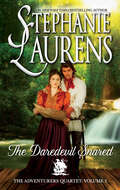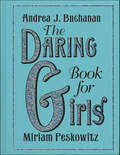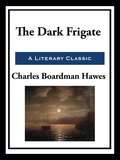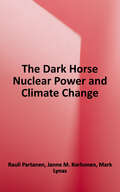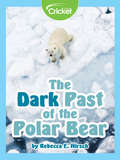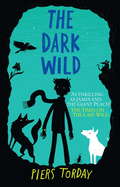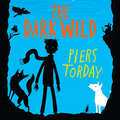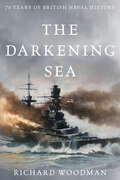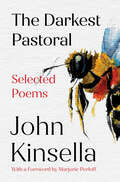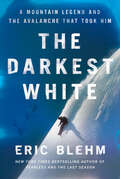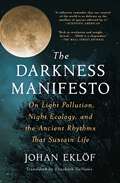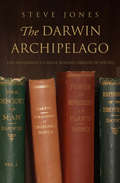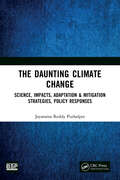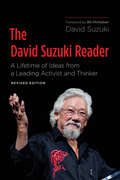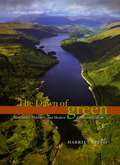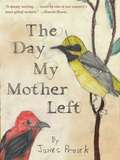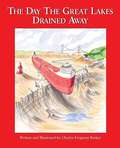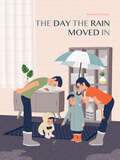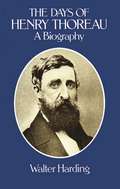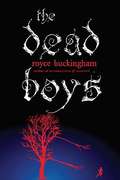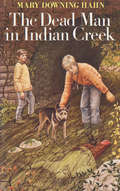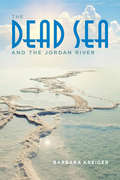- Table View
- List View
The Daredevil Snared (Adventurers Quartet #3)
by Stephanie LaurensResponsibility knocks, and a reckless, hedonistic man responds and opens the door to love—thus is a daredevil snared.<P><P> #1 New York Times bestselling author Stephanie Laurens brings you the third installment in THE ADVENTURERS QUARTET, continuing the drama of Regency-era high seas adventure, laced with a mystery shrouded in the heat of tropical jungles, and spiced with the passionate romances of four couples and their unexpected journeys into love.<P> Captain Caleb Frobisher, hedonistic youngest son of a seafaring dynasty, wants to be taken seriously by his family, and understands he has to prove himself sufficiently reformed. When opportunity strikes, he seizes the next leg of the covert mission his brothers have been pursuing and sails to Freetown. His actions are decisive, and he completes the mission's next stage—but responsibility, once exercised, has taken root, and he remains in the jungle to guard the captives whose rescue is the mission's ultimate goal.<P> Katherine Fortescue has fled the life of poverty her wastrel father had bequeathed her and come to Freetown as a governess, only to be kidnapped and put to work overseeing a child workforce at a mine. She and the other captured adults understand that their lives are limited by the life of the mine. Guarded by well-armed and well-trained mercenaries, the captives have been searching for some means of escape, but in vain. Then Katherine meets a handsome man—a captain—in the jungle, and he and his crew bring the sweet promise of rescue.<P> The sadistic mercenary captain who runs the mine has other ideas, but Caleb's true strength lies in extracting advantage from adversity, and through the clashes that follow, he matures into the leader of men he was always destined to be. The sort of man Katherine can trust—with her body, with her life. With her love.<P> The first voyage is one of exploration, the second one of discovery. The third journey brings maturity, while the fourth is a voyage of second chances. Continue the journey and follow the adventure, the mystery, and the romances to the dramatic end. <P><b>A New York Times Bestseller</b>
The Daredevil Snared (The Adventurers Quartet #3)
by Stephanie LaurensResponsibility knocks, and a reckless, hedonistic man responds and opens the door to love—thus is a daredevil snared.#1 New York Times bestselling author Stephanie Laurens brings you the third installment in THE ADVENTURERS QUARTET, continuing the drama of Regency-era high seas adventure, laced with a mystery shrouded in the heat of tropical jungles, and spiced with the passionate romances of four couples and their unexpected journeys into love.He has something to prove Captain Caleb Frobisher, hedonistic youngest son of a seafaring dynasty, wants to be taken seriously by his family, and understands he has to prove himself sufficiently reformed. When opportunity strikes, he seizes the next leg of the covert mission his brothers have been pursuing and sails to Freetown. His actions are decisive, and he completes the mission’s next stage—but responsibility, once exercised, has taken root, and he remains in the jungle to guard the captives whose rescue is the mission’s ultimate goal.She will risk everything Katherine Fortescue has fled the life of poverty her wastrel father had bequeathed her and come to Freetown as a governess, only to be kidnapped and put to work overseeing a child workforce at a mine. She and the other captured adults understand that their lives are limited by the life of the mine. Guarded by well-armed and well-trained mercenaries, the captives have been searching for some means of escape, but in vain. Then Katherine meets a handsome man—a captain—in the jungle, and he and his crew bring the sweet promise of rescue.Together they will face the future The sadistic mercenary captain who runs the mine has other ideas, but Caleb’s true strength lies in extracting advantage from adversity, and through the clashes that follow, he matures into the leader of men he was always destined to be. The sort of man Katherine can trust—with her body, with her life. With her love.The first voyage is one of exploration, the second one of discovery. The third journey brings maturity, while the fourth is a voyage of second chances. Continue the journey and follow the adventure, the mystery, and the romances to the dramatic end.Originally published in 2016
The Daring Book for Girls
by Andrea J. Buchanan Miriam PeskowitzThe Daring Book for Girls is the manual for everything that girls need to know—and that doesn't mean sewing buttonholes! Whether it's female heroes in history, secret note-passing skills, science projects, friendship bracelets, double dutch, cats cradle, the perfect cartwheel or the eternal mystery of what boys are thinking, this book has it all. But it's not just a guide to giggling at sleepovers—although that's included, of course! Whether readers consider themselves tomboys, girly-girls, or a little bit of both, this book is every girl's invitation to adventure.
The Dark Frigate
by Charles Boardman HawesThe Dark Frigate is a Newbery Medal winner for the year&’s most distinguished contribution to American literature for children, a swashbuckling tale of adventure and bravery on the high seas.
The Dark Horse: Nuclear Power and Climate Change
by Rauli Partanen Janne M. KorhonenClimate scientists consider climate change to be among top threats to humanity’s future. If unchecked, runaway climate change can destroy not just many of our current ecosystems, but wreak havoc in human societies as well. To prevent the worst catastrophe, greenhouse gas emissions from our energy system needs to decline to zero rapidly. We need to replace fossil fuels, which represent roughly 85 % of our energy production, with low-carbon alternatives. To manage this in a low-risk and timely manner, all tools need to be utilized to their maximum potential, including nuclear energy. Nuclear is surrounded by colourful rhetoric, politics, fear and fearmongering, click-bait scandal-headlines and mental images of dangerous radiation and catastrophic accidents. But how much of this is warranted, and how much is based on beliefs, opinions and prejudices? How dangerous is ionizing radiation really? What happened in Chernobyl and Fukushima, and what are the best estimates on their effects on public health and the environment? And can we harness nuclear energy to play a major role in decarbonizing our energy systems rapidly and more affordably? This book takes a serious look how the climate change mitigation is progressing, what needs to be done, and how nuclear has helped in the past, and can help us in the future. Partanen is an award-winning science writer and analyst on climate, environment, energy and society. Korhonen did his PhD in the history of technology, has written about climate and energy for years and is currently researching “Plan B”, an emergency program for climate change mitigation.
The Dark Past of the Polar Bear
by Rebecca E. HirschPolar bears rule the frozen sea, but their ancestors weren't always built for ice and snow.
The Dark Wild: Book 2 (The Last Wild Trilogy #2)
by Piers TordayWINNER OF THE GUARDIAN CHILDREN'S FICTION PRIZE 2014. A thrilling animal adventure for fans of Roald Dahl, David Walliams and Katherine RundellTwelve-year-old Kester thought he had discovered the last wild animals in the land. He thought his adventure was over. He was wrong. Below the sparkling city of Premium, deep underground, a dark wild remains: animals who believe the time is right to rise up against their human enemies. And soon Kester realises: he is the only one who can stop them. Kester Jaynes saved the animals. Can he save the humans too?
The Dark Wild: Book 2 (The Last Wild Trilogy #2)
by Piers TordayWINNER OF THE GUARDIAN CHILDREN'S FICTION PRIZE 2014. Twelve-year-old Kester thought he had discovered the last wild animals in the land. He thought his adventure was over. He was wrong. Below the sparkling city of Premium, deep underground, a dark wild remains: animals who believe the time is right to rise up against their human enemies. And soon Kester realises: he is the only one who can stop them. Kester Jaynes saved the animals. Can he save the humans too?(P)2014 WF Howes Ltd
The Darkening Sea
by Richard WoodmanFrom the clash of mighty battleships at Jutland in 1916 to the cold splendor of the present-day Arctic, The Darkening Sea is a modern seafaring epic that traces the fortunes of the Martin family throughout nearly seventy years of British maritime history.James and John Martin see varied action from service on battle-cruisers in the North Sea during the Great War to cargo-passenger ships on the exploited coast of 1930s China; from the war of corvette vs. U-boats in the North Atlantic to the long slog of Pacific Fleet protection in a WWII destroyer. Along the way, they find love, disillusion, and fulfillment. The women in their lives—sisters, wives, and lovers—also have their own ambitions in an ever-changing world.
The Darkest Pastoral: Selected Poems
by John KinsellaOne of Australia’s most treasured poets draws on the past to reckon with the perils of the present. Illuminated by the spirit of ecological activism and decolonization, The Darkest Pastoral engages deeply with nature, climate catastrophe, and grief, and the interconnectedness between humans and the natural world. John Kinsella’s poetry stretches and often breaks the lyric in an attempt to create new modes of intervention and action. Though focused around his homeplace in the Western Australian wheatbelt, much of his poetry converses with other places around the world, especially those he has lived in for extended periods of time, including central Ohio; Cambridge, England; West Cork, Ireland; and southern Germany Often writing in an anti-pastoral mode, Kinsella experiments with the histories of poetry, art, and music, to create a poetry that will respect ecologies and bring positive changes in destructive human behaviors. His poetry, both experimental and pastoral, about the natural world is centrally preoccupied with birds and plants, and often features the landscape of Western Australia. Kinsella’s artistic response to ecological catastrophe is in dynamic conversation with the work of many artists and writers—Andy Warhol, Jackson Pollock, Helen Frankenthaler, and Jacques Derrida, among others. With acuity and empathy, this collection is a poetic attempt to reckon with a world in transition. “These are great ecological poems, whose wide sweep becomes increasingly astonishing as the years go by. At this writing, John Kinsella is a mere sixty. Who knows what is yet to come?”—from the foreword by Marjorie Perloff
The Darkest White: A Mountain Legend and the Avalanche That Took Him
by Eric Blehm“Eric Blehm offers an insightful perspective on how Craig Kelly became the effortless icon that we all revered as well as sobering details of how his heroic journey tragically ended. The Darkest White is a must read, not just for fans of snowboarding, but for anyone looking for inspiration from an unlikely hero.”—Tony HawkFrom Eric Blehm, the bestselling author of The Last Season and Fearless, comes an extraordinary new book in the vein of Into the Wild, the story of the legendary snowboarder Craig Kelly and his death in the 2003 Durrand Glacier Avalanche—a devastating and controversial tragedy that claimed the lives of seven people.On January 20, 2003, a thunderous crack rang out and a violent tide of snow barreled down the northern Selkirk Mountains in British Columbia, Canada, burying thirteen skiers and snowboarders. Among them was Craig Kelly—“the Michael Jordan of snowboarding”—a world champion who had propelled the sport into the mainstream before walking away from competitions to rekindle his passion in the untamed alpine wilds of North America.The Darkest White tells the story of Craig Kelly’s life, an extraordinary and inspiring odyssey of a latchkey kid whose athletic prowess and innovations revolutionized winter sports, carried him around the globe, and pushed him into increasingly extreme backcountry environments. It is also a definitive, immersive account of how snowboarding grew from a minor Gen X cult hobby to Olympic centerpiece and a billion-dollar business full of feuds and rivalries. This mesmerizing tribute is a cautionary portrait of the mountains, of the allure and the glory they offer, and of the avalanches they unleash with unforgiving fury."The most unremittingly exciting book of nonfiction I have come across in recent years. I found myself reading late into recent nights wholly transfixed by every paragraph, every word."—Simon Winchester, New York Times Book Review
The Darkness Manifesto: On Light Pollution, Night Ecology, and the Ancient Rhythms that Sustain Life
by Johan EklöfIn the bestselling tradition of Why We Sleep and The Sixth Extinction, an urgent and insightful look at the hidden impact of light pollution, and a passionate appeal to cherish natural darkness for the sake of the environment, our own well-being, and all life on earth.How much light is too much light? Satellite pictures show our planet as a brightly glowing orb, and in our era of constant illumination, light pollution has become a major issue. The world&’s flora and fauna have evolved to operate in the natural cycle of day and night. But in the last 150 years, we have extended our day—and in doing so have forced out the inhabitants of the night and disrupted the circadian rhythms necessary to sustain all living things, including ourselves. In this persuasive, well-researched book, Swedish conservationist Johan Eklöf urges us to appreciate natural darkness, its creatures, and its unique benefits. Eklöf ponders the beauties of the night sky, traces the errant paths of light-drunk moths and the swift dives of keen-eyed owls, and shows us the bioluminescent creatures of the deepest oceans. As a devoted friend of the night, he writes passionately about the startling damage we inflict on ourselves and our fellow creatures simply by keeping the lights on. The Darkness Manifesto depicts the domino effect of diminishing darkness: insects, dumbfounded by streetlamps, failing to reproduce; birds blinded and bewildered by artificial lights; and bats starving as they wait in vain for food insects that only come out in the dark of night. For humans, light-induced sleep disturbances impact our hormones and weight, and can contribute to mental health problems like chronic stress and depression. The streetlamps, floodlights, and neon signs of cities are altering entire ecosystems, and scientists are only just beginning to understand the long-term effects. The light bulb—long the symbol of progress and development—needs to be turned off. Educational, eye-opening, and ultimately encouraging, The Darkness Manifesto outlines simple steps that we can take to benefit ourselves and the planet. In order to ensure a bright future, we must embrace the darkness.
The Darwin Archipelago
by Steve JonesCharles Darwin is of course best known for The Voyage of the Beagle and The Origin of Species. But he produced many other books over his long career, exploring specific aspects of the theory of evolution by natural selection in greater depth. The eminent evolutionary biologist Steve Jones uses these lesser-known works as springboards to examine how their essential ideas have generated whole fields of modern biology. Earthwormshelped found modern soil science,Expression of the Emotionshelped found comparative psychology, andSelf-FertilizationandForms of Flowerswere important early works on the origin of sex. Through this delightful introduction to Darwin's oeuvre, one begins to see Darwin's role in biology as resembling Einstein's in physics: he didn't have one brilliant idea but many and in fact made some seminal contribution to practically every field of evolutionary study. Though these lesser-known works may seem disconnected, Jones points out that they all share a common theme: the power of small means over time to produce gigantic ends. Called a "world of wonders" by theTimesof London,The Darwin Archipelagowill expand any reader's view of Darwin's genius and will demonstrate how all of biology, like life itself, descends from a common ancestor.
The Daunting Climate Change: Science, Impacts, Adaptation & Mitigation Strategies, Policy Responses
by Jayarama Reddy PuthalpetThe book starts with an overview of Climate Science. It discusses the signs of Warming, the impacts and consequences on several sectors - terrestrial and coastal ecosystems, water resources, ocean systems, agriculture, food production and food security, human health and safety, livelihoods and poverty, Arctic populations, low-lying States, so on. Mathematical models to project future climate and the resulting concerns, global adaptation experiences, and opportunities for future execution are explained. The mitigation approaches, chiefly decarbonizing the energy sector by developing and applying clean/low carbon energy sources and improving energy efficiency, and the evolving geoengineering schemes are dealt. Carbon pricing, an economic tool to ensure emissions reductions, and transition to a low carbon economy to stimulate sustainable growth are described. The continued global efforts under the UN or otherwise until the recent Paris Agreement to arrive at policy responses to tackle this intriguing but daunting problem of climate change are vividly expounded. Note: T&F does not sell or distribute the hardback in India, Pakistan, Nepal, Bhutan, Bangladesh and Sri Lanka.
The David Suzuki Reader
by Bill Mckibben David SuzukiIn this revised and expanded edition of his collected writings, David Suzuki continues to explore the themes that have informed his work for more than four decades - the interconnectedness of all things, our misguided elevation of economics above all else, the urgent need to deal with climate change - but with an increased emphasis on solutions to the myriad problems we face, his inspiring vision for the future, and the legacy he hopes to leave behind. There is also more emphasis on the personal, as he recounts episodes from his childhood and early adulthood and speaks eloquently about old age, death, and the abiding role of nature and family in his life. Written with clarity, passion, and wisdom, this book is essential for anyone who is an admirer of David Suzuki, who wants to understand what science can and can't do, or who wants to make a difference.
The David Suzuki Reader
by David SuzukiDavid Suzuki’s collected writings on science, nature, technology, economics, politics, and the connectedness of all things. The David Suzuki Reader brings together for the first time the scientific and philosophical thought of North America’s leading environmentalist. Drawing from Suzuki’s published and unpublished writings, this collection reveals the underlying themes that have informed his work for over four decades. In these incisive and provocative essays, Suzuki explores the limits of knowledge and the connectedness of all things; looks unflinchingly at the destructive forces of globalization, political shortsightedness, and greed; cautions against blind faith in science, technology, politics, and economics; and provides inspiring examples of how and where to make those changes that will matter to all of us and to future generations. He also offers a vision of hope based on our love of children and nature. In this time of global unrest and uncertainty, Suzuki provides an important reminder of how we are all connected and of what really matters. Written with clarity, passion, and wisdom, this book is essential reading for anyone who is an admirer of David Suzuki, who wants to understand what science can and can’t do, or who wants to make a difference.
The Dawn of Green: Manchester, Thirlmere, and Modern Environmentalism
by Harriet RitvoLocated in the heart of England's Lake District, Thirlmere, with its placid sheen, surrounding evergreens, and apparent lack of pollution or development, seems to epitomize the unadulterated bucolic ideal. But under its calm surface lurks the enduring legacy of a nineteenth-century conflict that pitted industrial progress against natural conservation--and helped launch the environmental movement as we know it. Purchased by the city of Manchester in the 1870s, Thirlmere was dammed and converted into a reservoir, its water piped 100 miles south to the burgeoning industrial city and its workforce. This feat of civil engineering--and of natural resource diversion--inspired one of the first environmental struggles of modern times. The Dawn of Green recreates the battle for Thirlmere and the clashes between conservationists who wished to preserve the lake and developers eager to supply the needs of industry and a growing urban population. Bringing to vivid life the colorful and strong-minded characters who populated both sides of the debate, noted historian Harriet Ritvo revisits notions of the natural promulgated by Romantic poets, recreationists, resource managers, and industrial developers to establish Thirlmere as the template for subsequent--and continuing--environmental struggles. A century after Thirlmere, the demand for water and the control of water rights are among the most pressing political, humanitarian,and environmental concerns of our time. By investigating Victorian ideas about industry, development, and technology, Ritvo shows how the lessons learned in the Lake District can inform and guide modern environmental and conservation campaigns.
The Dawn of Green: Manchester, Thirlmere, and Modern Environmentalism
by Harriet RitvoLocated in the heart of England’s Lake District, the placid waters of Thirlmere seem to be the embodiment of pastoral beauty. But under their calm surface lurks the legacy of a nineteenth-century conflict that pitted industrial progress against natural conservation—and helped launch the environmental movement as we know it. Purchased by the city of Manchester in the 1870s, Thirlmere was dammed and converted into a reservoir, its water piped one hundred miles south to the burgeoning industrial city and its workforce. This feat of civil engineering—and of natural resource diversion—inspired one of the first environmental struggles of modern times. The Dawn of Green re-creates the battle for Thirlmere and the clashes between conservationists who wished to preserve the lake and developers eager to supply the needs of a growing urban population. Bringing to vivid life the colorful and strong-minded characters who populated both sides of the debate, noted historian Harriet Ritvo revisits notions of the natural promulgated by romantic poets, recreationists, resource managers, and industrial developers to establish Thirlmere as the template for subsequent—and continuing—environmental struggles.
The Day My Mother Left
by James ProsekJeremy's whole life changed the day his mother left. When his mother leaves with the father of his worst enemy at school, nine-year-old Jeremy seeks to make sense of her abandonment. He throws himself into recreating theBook of Birds,a collection of drawings that his mother took with her on the day she left. While his father fights his own depression and his sister distances herself from their lives, Jeremy turns wholeheartedly to nature, and finds solace in the quiet comfort of drawing. In this novel, James Prosek tells Jeremy's story without blame, without self-pity, and without excuses. The Day My Mother Leftshould be read by anyone who has gone through the pain of losing a parent, and by anyone who wants to meet Jeremy, a boy who can see inside himself the person he wants to become.
The Day the Great Lakes Drained Away
by Charles Ferguson BarkerA fascinating—and entertaining—cautionary story about what the Great Lakes would look like without water. What’s down there (garbage, lost sunglasses). And what would happen with no water (boats would tip over and be stranded).Each Great Lake is analyzed, with humorous—yet also serious—solutions to the problem. For example, instead of driving for HOURS to get to the other side of Lake Michigan, without water, you could just drive your car across the now-dry lake.The book also serves as inspiration for readers to take care of these beautiful waters, to make sure they are clean and last forever.The book contains NOAA maps that show the underwater features of the lakes, and pages of facts about each one.
The Day the Rain Moved In
by Éléonore DouspisIn this beautiful picture book, the wondrous merges with the ordinary when it starts to rain … inside the house! One day, it starts to rain in Pauline and Louis’s house. The whole family looks for the source of the rain, but nothing can be found! Dad tries to mop up the puddles that form on the floor, Mom holds an umbrella over her head to read, and Pauline and Louis wear their raincoats. Everyone tries to pretend that nothing is wrong. Pauline and Louis are embarrassed and try to keep their rainy house a secret from the other kids at school, expecting to be teased. What would happen if someone found out? Outside, the sun is shining. But inside the house, something new is happening. Plants sprout from the carpet, the bathtub and the kitchen sink. A giant tree spreads its branches through the living room. The neighborhood children, curious about the leaves they see through the windows, come inside. Instead of teasing, they want to play. Pauline and Louis aren’t alone with their secret any longer. In fact, having a tree in the house is kind of fun! Soon, the branches grow too big for the house, and sunlight streams in through holes in the roof. There’s something else, new, too — the rain has finally stopped. A story about embracing difference, celebrating the wondrous and expecting the best from our friends. This nuanced and layered story will have both very young and school-aged children requesting repeated readings. Correlates to the Common Core State Standards in English Language Arts: CCSS.ELA-LITERACY.RL.2.3 Describe how characters in a story respond to major events and challenges.
The Days of Henry Thoreau
by Walter Harding"The best biography we have had." -- Carl Bode, The New York Times Book ReviewHenry David Thoreau is generally remembered as the author of Walden and "Civil Disobedience," a recluse of the woods and political protester who once went to jail. To his contemporaries he was a minor disciple of Emerson; he has since joined the ranks of America's most respected and beloved writers. Few, however, really know the complexity of the man they revere -- wanderer and scholar, naturalist and humorist, teacher and surveyor, abolitionist and poet, Transcendentalist and anthropologist, inventor and social critic, and, above all, individualist.In this widely acclaimed biography, outstanding Thoreau scholar Walter Harding presents all of these Thoreaus. Scholars will find here the culmination of a lifetime of research and study, meticulously documented; general readers will find an absorbing story of a remarkable man. Writing always with supreme clarity, Professor Harding has marshaled all the facts so as best to "let them speak for themselves." Thoreau's thoughtfulness and stubbornness, his more than ordinarily human amalgam of the earthy and the sublime, his unquenchable vitality emerge to the reader as they did to his own family, friends, and critics.You will see Thoreau's work in his family's pencil factory, his accidental setting of a forest fire, his love of children and hatred of hypocrisy, his contributions to the scientific understanding of forest trees, and other more and less familiar aspects of the man and his works. You will find the social as well as the reclusive Thoreau. Reactions to him by such notable contemporaries as Margaret Fuller, Nathaniel Hawthorne, and Walt Whitman -- with Thoreau's responses to them -- are given in rich detail.The totality is as complete, accurate, fair, vivid, and fully rounded a portrait as has ever been drawn. On its appearance, Professor Harding's work immediately established itself as "the standard biography" (Edward Wagenknecht). It has never been superseded. For this Dover edition, the author has corrected minor errors, provided an appendix bibliographically documenting hundreds of facts, and contributed an Afterword updating some of his findings and discussing Thoreau scholarship.
The Dead Boys
by Royce BuckinghamIn the desert town of Richland, Washington, there stands a giant sycamore tree. Horribly mutated by nuclear waste, it feeds on the life energy of boys that it snags with its living roots. And when Teddy Matthews moves to town, the tree trains its sights on its next victim. From the start, Teddy knows something is very wrong with Richland-every kid he meets disappears before his eyes. A trip to the cemetery confirms that these boys are actually dead and trying to lure him to the tree. But that knowledge is no help when Teddy is swept into the tree's world, a dark version of Richland from which there is no escape . . . .
The Dead Man in Indian Creek
by Mary Downing HahnAt the same time that Matt and Parker find the body of the dead man in the creek, they recognize George Evans, the owner of the antique shop where Parker's mother works.
The Dead Sea and the Jordan River
by Barbara KreigerFor centuries travelers have been drawn to the stunning and mysterious Dead Sea and Jordan River, a region which is unlike any other on earth in its religious and historical significance. In this exceptionally engaging and readable book, Barbara Kreiger chronicles the natural and human history of these storied bodies of water, drawing on accounts by travelers, pilgrims, and explorers from ancient times to the present. She conveys the blend of spiritual, touristic, and scientific motivations that have driven exploration and describes the modern exploitation of the lake and the surrounding area through mineral extraction and agriculture. Today, both lake and river are in crisis, and stewardship of these water resources is bound up with political conflicts in the region. The Dead Sea and the Jordan River combines history, literature, travelogue, and natural history in a way that makes it hard to put down.
